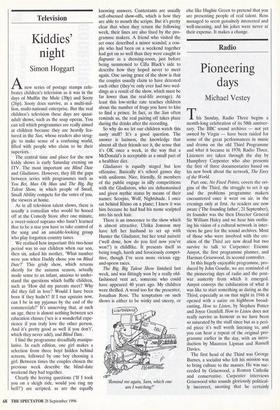Television
Kiddies' night
Simon Hoggart
Anew series of postage stamps cele,- brates children's television as it was in the days of Muffin the Mule (20p) and Sooty (26p). Sooty does survive, as a multi-mil- lion, multi-national enterprise. But the real children's television these days are quasi- adult shows, such as the soap operas. You can tell which programmes are really aimed at children because they are heavily fea- tured in the Sun, whose readers also strug- gle to make sense of a confusing world, filled with people who claim to be their superiors.
The central time and place for the new kiddy shows is early Saturday evening on ITV. The most important are Blind Date and Gladiators. However, they fill the gaps between series with programmes such as You Bet, Man Oh Man and The Big, Big Talent Show, in which people of Small, Small Ability compete for the votes of you, the viewers at home.
As in all television talent shows, there is usually a comedian who would be booed off at the Comedy Store after one minute, a sweet-voiced soprano who hasn't learned that to be a star you have to take control of the song and an amiable-looking group who play forgotten country tunes.
We realised how important this two-hour period was to our children when our son, then six, asked his mother, 'What number were you when Daddy chose you on Blind Date?' This grisly show, which returns shortly for the autumn season, actually made sense to an infant, anxious to under- stand the questions which baffle children, such as 'How did my parents meet? Why did they fall in love? Would I have been born if they hadn't? If I run upstairs now, can I be in my pyjamas by the end of the commercials?' It's unnerving that, at such an age, there is almost nothing between sex education classes ('sex is a wonderful expe- rience if you truly love the other person. And it's pretty good as well if you don't', which they never add), and Blind Date.
I find the programme dreadfully manipu- lative. In each edition, one girl makes a selection from three boyS hidden behind screens, followed by one boy choosing a girl. Between times the couples chosen the previous week describe the blind-date weekend they had together.
Clearly the leering questions ('If I took you on a sleigh ride, would you ring my bell?') are scripted, as are the equally knowing answers. Contestants are usually self-obsessed show-offs, which is how they are able to mouth the scripts. But it's pretty clear that when they return the following week, their lines are also fixed by the pro- gramme makers. A friend who visited the set once described a minor scandal; a cou- ple who had been on a weekend together had got on so well than they were caught in flagrante in a dressing-room, just before being summoned to Cilia Black's side to describe how they hoped never to meet again. One saving grace of the show is that the couples usually claim to have detested each other (they've only ever had two wed- dings as a result of the show, which must be far lower than the real-life average). At least this low-strike rate teaches children about the number of frogs you have to kiss to find a prince. In fact, as the Sun often reminds us, the real pairing off takes place during the drinks after the recording.
So why do we let our children watch this nasty stuff? It's a good question. The answer is laziness, the knowledge that almost all their friends see it, the sense that it's OK once a week, in the way that a McDonald's is acceptable as a small part of a healthier diet.
Gladiators is equally staged but less offensive. Basically it's school games day with uniforms. Nice, friendly, fit members of the public engage in silly competitions with the Gladiators, who are dehumanised and given mythic status by means of their names: Scorpio, Wolf, Nightshade. I once sat behind Rhino on a plane; I knew it was him because he had had his name sculpted into his neck hair.
There is an innocence to the show which is almost attractive. Ulrika Jonsson may have left her husband to set up with Hunter the Gladiator, but her total naiveté (*ell done, how do you feel now you've won?') is childlike. It presents itself as being tough, harsh and ferociously compet- itive, though I've seen more vicious egg- and-spoon races.
The Big, Big Talent Show finished last week, and was fittingly won by a really old- fashioned vent act, someone who could have appeared 40 years ago. My children were thrilled. A word too for the presenter, Jonathan Ross. The temptation on such shows is either to be winky and sneery, or
Remind me again,. Sam, which one am I watching?'
else like Hughie Green to pretend that you are presenting people of real talent. Ross managed to seem genuinely interested and well-meaning, and his jokes were never at their expense. It makes a change.


















































































 Previous page
Previous page